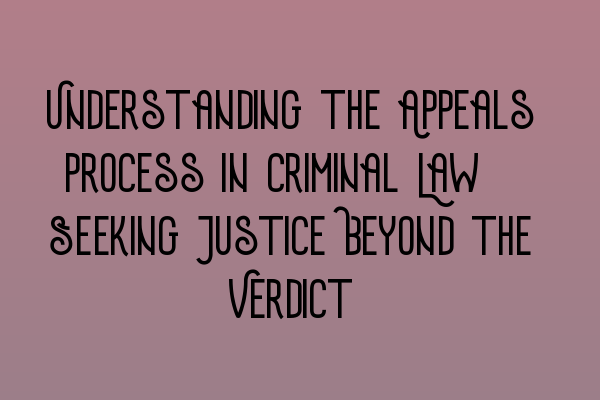Understanding the Appeals Process in Criminal Law: Seeking Justice Beyond the Verdict
When it comes to the legal system, the pursuit of justice doesn’t always end with the verdict. In criminal law, the appeals process plays a crucial role in ensuring fairness and rectifying any errors that may have occurred during the trial. Understanding how the appeals process works is essential for both legal professionals and individuals who find themselves seeking justice beyond the initial verdict.
The Basics of the Appeals Process
The appeals process allows individuals who have been convicted of a crime to challenge the decision made by the trial court. It provides an avenue for review and reconsideration of the initial verdict, with the aim of correcting any legal errors or unfairness that may have influenced the outcome.
It’s important to note that appeals are not rehearings of the entire case. Instead, they focus on specific legal issues or matters of procedure that may have affected the fairness of the trial. The appeals process is based on written submissions and arguments presented to a higher court, rather than the examination of new evidence or witnesses.
Grounds for Appeal
Appeals can be made on various grounds, including:
- Inadequate legal representation
- Judicial misconduct or bias
- Errors in the application of the law
- Introduction of improper evidence
- Procedural irregularities
Each ground for appeal requires careful examination of the trial transcripts, legal documents, and relevant case law. It is crucial to identify specific errors or unfairness that can form the basis of a successful appeal.
The Appeals Process in Practice
The appeals process typically begins with the filing of a notice of appeal within a specified time frame after the conviction. This notice informs the court and the opposing parties of the intention to challenge the verdict. It is important to comply with the procedural requirements and deadlines to ensure a valid appeal.
Once the notice of appeal is submitted, the appellant’s legal team prepares written arguments, known as briefs, explaining the grounds for appeal and supporting their position with relevant legal authority. The opposing party, usually the prosecution, then has an opportunity to respond with their own briefs.
After the written submissions are filed, the higher court will review the arguments presented by both parties and may schedule an oral hearing. During this hearing, the appellant’s legal team and the opposing party will present their case, addressing the legal issues raised in the appeal.
Ultimately, the higher court will decide whether the appeal is successful or not. If the appeal is granted, the court may overturn the conviction, order a new trial, or modify the initial ruling. However, if the appeal is denied, the conviction and the original verdict will stand.
Professional Assistance for Your Appeal
Navigating the appeals process can be complex and requires in-depth knowledge of criminal law and procedure. Hiring an experienced solicitor who specializes in criminal appeals can significantly increase your chances of success.
At SQE Criminal Law & Practice Law UK, we provide comprehensive legal services to individuals seeking justice beyond the verdict. Our team of solicitors has a wealth of experience in handling appeals and will work tirelessly to protect your rights and ensure a fair review of your case.
If you need assistance with your appeal, contact us today to discuss your situation and explore the options available to you. Our dedicated team is here to guide you through the appeals process and fight for the justice you deserve.
Related Articles:
